|
Printables |
PowerPoints |
Online exercises |
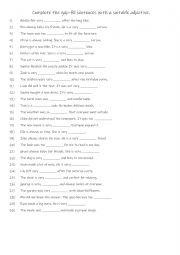
|
A2-B1 Complete the gap-fill sentences with a suitable adjective.
Students read the sentences then complete the gap-fill with a suitable adjective. This worksheet could also be used as a warmer/ cooler game where students get 1 point for a suitable adjective and 3 points if no other team has used that adjective. Possible answers on page 2.
Level: intermediate
Age: 10-100
Type:
Downloads: 132
|
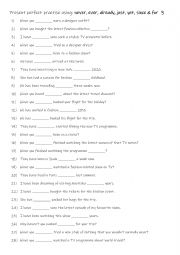
|
A2+-B1 Present perfect practise using never, ever, already, just, yet, since & for 3
First, students need to familiarise themselves with adverbs and their use. Then they read the sentences to see which one is needed to complete the gap-fill. Answers on page 2.
Level: intermediate
Age: 8-100
Type:
Downloads: 116
|
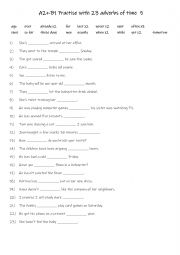
|
A2+-B1 Practise with 17 adverbs of time 5
Recognising these expressions improves listening and reading comprehension, enabling students to grasp stories, instructions, and conversations more effectively. First, students need to familiarise themselves with the 17 time expressions and their use. Then they read the sentences to work out which one is needed to complete the gap-fill. Answers on...
Level: elementary
Age: 9-100
Type:
Downloads: 113
|
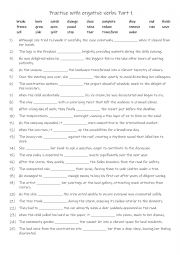
|
B1+-B2 Practise with 25 ergative verbs Part 1
Learning ergative verbs is valuable because it enhances understanding of how English communicates both active and passive meanings without altering verb forms. Ergative verbs make it easier to switch between active and passive-like constructions. For example, "The ice melted" and "They melted the ice" show how an action can be described from differ...
Level: intermediate
Age: 10-100
Type:
Downloads: 113
|
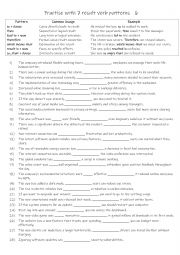
|
B1-B2 Practise with 7 result verb patterns 6
First, students need to familiarise themselves with the 7 result verb patterns and use. Then they read the sentences to work out which one is needed to complete the gap-fill. Each verb pattern is used 4 times! Answers on page 2.
Level: intermediate
Age: 10-100
Type:
Downloads: 117
|
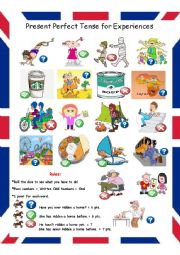
|
Present Perfect Tense for Experiences
An enjoyable speaking and writing supplement to reinforce asking questions, answering using both affirmative and negative sentences. To get a mixture of both oral and written work I normally have something small enough to hide in my hand. If the object is in the hand not selected, they have to write the sentence. To encourage students, I usually gi...
Level: elementary
Age: 9-100
Type: activity-card
Downloads: 271
|
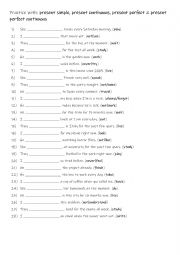
|
B1 -B2 Practice with present simple, present continuous, present perfect & present perfect continuous
Learning the present simple, present continuous, present perfect, and present perfect continuous tenses is crucial for students as these tenses allow them to express a wide range of meanings related to actions and states in the present. The present simple is used for routines and facts, the present continuous for actions happening now, the present ...
Level: intermediate
Age: 9-100
Type:
Downloads: 108
|
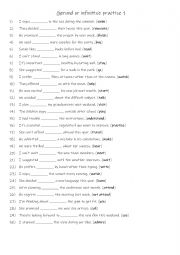
|
A2+-B1 Gerund or infinitive practise 1
Learning the difference between gerunds and infinitives is essential for achieving accuracy and fluency in English. Gerunds (verbs ending in -ing, like "swimming") and infinitives (the base form with "to," like "to swim") often have specific rules or conventions that dictate their use, which can change the meaning of a sentence. For example, "I sto...
Level: intermediate
Age: 8-100
Type:
Downloads: 114
|
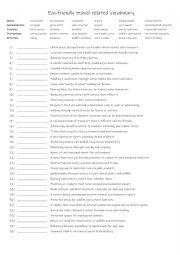
|
A2+-B1 Eco-friendly travel related vocabulary
First, students need to familiarise themselves with the 36 words and their meanings. Then they read the definitions to see which one is being described and write that word in the space provided Answers on page 2.
Level: intermediate
Age: 9-100
Type:
Downloads: 118
|
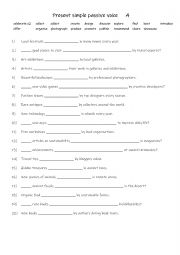
|
Present simple passive voice 4
Learning the present simple passive voice helps students focus on the action or the recipient, rather than the doer. It�s useful when the doer is unknown, unimportant, or to emphasize the object. Mastering this structure improves clarity, variety in sentence construction, and is essential for formal or academic communication. Students complete the ...
Level: elementary
Age: 9-100
Type:
Downloads: 126
|
|
|
|
|












